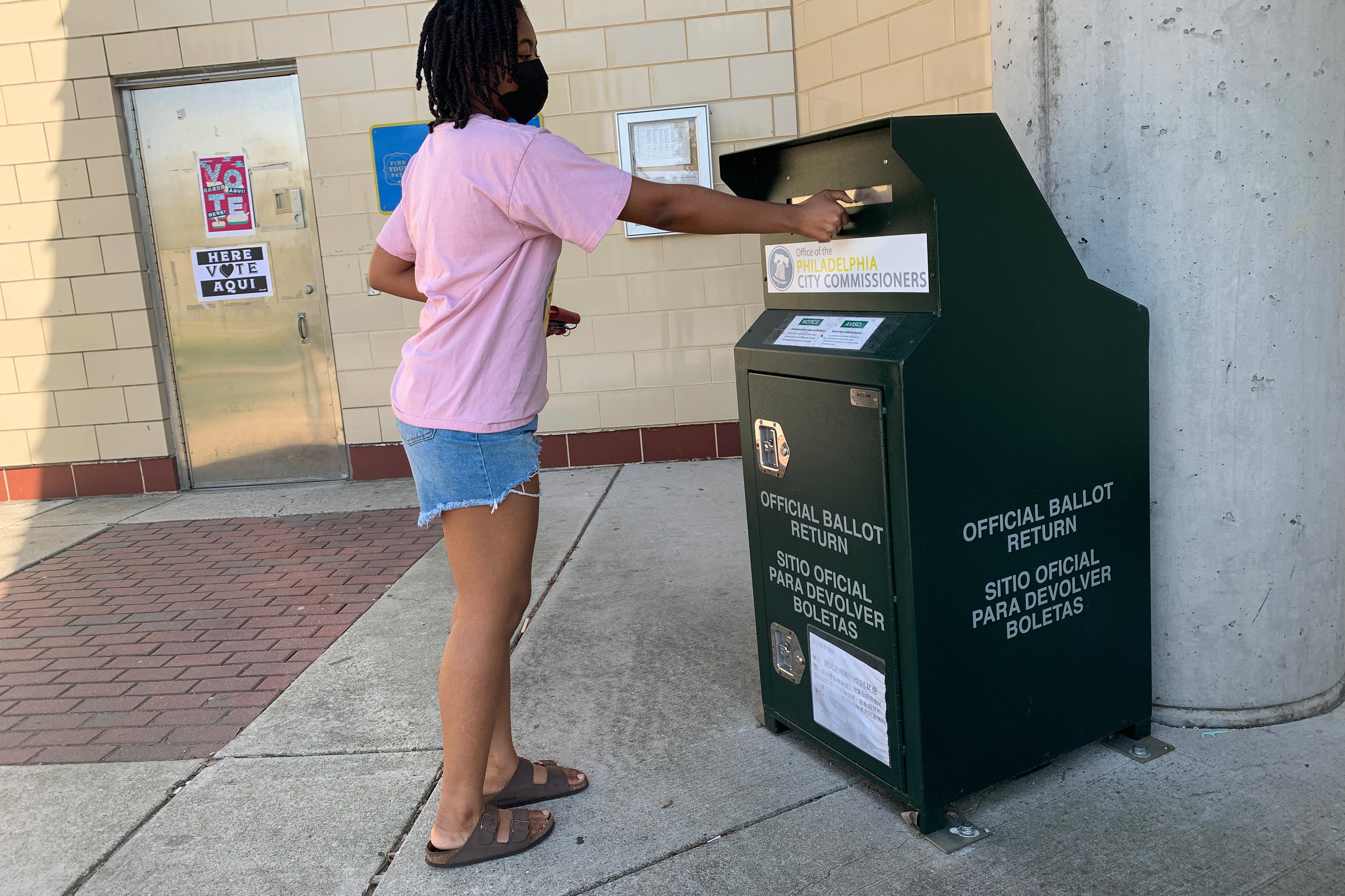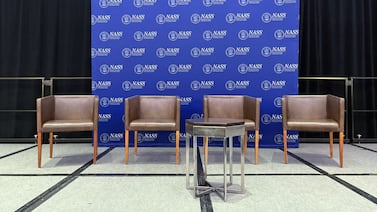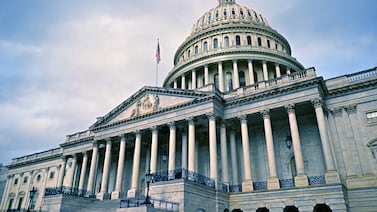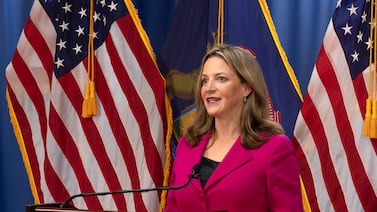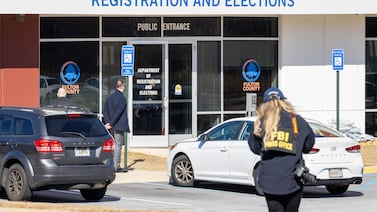A version of this post was originally distributed in Votebeat’s weekly newsletter. Sign up here.
Admittedly, Pennsylvania had plenty of drama leading up to the primary.
A man in a tricorn hat blocked reporters from a get–out-the-vote rally for Republican gubernatorial candidate Doug Mastriano and U.S. Senate candidate Kathy Barnette.
Attorney General Josh Shapiro, a Democrat running for governor, spent Election Day with COVID-19. John Fetterman, the state’s lieutenant governor, had a stroke last week, but easily won the Democratic nomination for U.S. Senate anyway.
But the drama mostly stopped at the ballot box: Across the state, the election itself went pretty smoothly, with the exception of some isolated issues. In a phone interview with Votebeat Wednesday, after the primary, Nick Custodio, a deputy city commissioner in Philadelphia, described it as “fairly routine.”
Of course, that doesn’t mean the final results were in on Tuesday night.
Election officials around the state, as expected, were tallying tens of thousands of mail ballots late into the week.
As we wrote earlier this month, Pennsylvania is one of a minority of states that doesn’t allow election workers to open and process mail ballots before Election Day, a process known as pre-canvassing.
That restriction, which election officials have repeatedly lobbied lawmakers to lift, means counties must wait to start processing those ballots, which number in the hundreds of thousands across the state, until at least 7 a.m. on Election Day, and some start later. Because of that, results can take longer, but it’s a normal and expected part of the process.
But that processing restriction certainly delayed the discovery that, in Lancaster County, the county’s vendor printed the wrong identification code on approximately 22,000 ballots, according to a statement from the Lancaster County elections board and the vendor, NPC.
Elections workers in Lancaster County, located in Pennsylvania Dutch Country along the Susquehanna River, had to work in teams of three to hand-copy 16,800 flawed ballots onto ballots that could then be scanned and tabulated. That process was completed at 7 p.m. Thursday night and those votes have now officially been included in the county’s vote tallies, said Larry George, Lancaster County’s chief clerk. This wasn’t the first time, either: the county hired NPC after a different mail-ballot vendor made a similar error in 2021.
County election officials said they approved NPC’s ballots only after test ballots, equipped with the correct code, had earlier scanned properly.
George said there will be an investigation into NPC’s error, but he praised the company for how it handled the error. “I give credit to the company for taking full responsibility for this mistake,” George said, adding. “Our experience with them before Tuesday was largely positive.”
It didn’t catch the problem in this case, but testing prior to elections is the best thing for counties to do, said Tammy Patrick, senior advisor to the elections program at the Democracy Fund — which means checking everything from voting machines to whether everything is spelled correctly on the ballot.
The delayed results come as Keystone Staters wait to hear the results of a tight race for the Republican U.S. Senate nomination. An automatic recount is triggered under Pennsylvania law if the difference between the top two candidates for statewide office is 0.5 percent of the vote or less, unless the affected candidates waive their right to it. Acting Secretary of State Leigh M. Chapman would have to order the recount by May 26 at 5 p.m. Two candidates — Dr. Mehmet Oz and David McCormick — appear likely to trigger the mandatory recount. (The Philadelphia Inquirer has a good explanation of key dates here.)
Last year, the state saw a mandatory recount in a Commonwealth Court election. At the time, the secretary of state’s office estimated that one would cost at least $1.3 million.
Oz, of course, was former President Donald Trump’s choice for the office, and he’s encouraged the TV doctor to simply declare victory. So far, Oz hasn’t. McCormick says that the so-far uncounted ballots will put him over the top. The process continues.
Back Then
Pennsylvania was the site of the most expansive shift in voting power during the time of the American Revolution. During the first few months of 1776, members of small militia groups rallied for their own ability to cast a ballot. The Committee of Privates — which spoke for lower rank militia members of “middling sorts” — asked the provincial assembly to offer the franchise to “brave and spirited Germans and others” who had joined in the battle against the British. They succeeded, leading to the largest single enfranchisement of new voters to this point in American history.
In Other Voting News
- Arizona will likely see recounts after every election if a bill passed by the state Legislature last week goes into effect, our Arizona reporter, Jen Fifield, reported this week. The bill will widen the margin of votes between candidates that triggers an automatic recount, making such recounts more frequent and likely increasing election costs and delaying final results.
- NPR found conservative nonprofit True the Vote has made false or misleading assertions about its work in the “2,000 Mules,” film, including suggesting they helped solve a child’s murder. And they aren’t the only ones. The Washington Post sits down with Dinesh D’Souza to “discuss the film…from a position of skepticism.”
- Turnout for North Carolina’s primary was unusually high for a year without a gubernatorial or presidential race, but the state “had no reports of significant errors or mishaps,” reports Carolina Public Press.
- A wealthy local Republican official is personally funding a lawsuit to clarify how closely the public can observe vote-counting in Nevada, according to the Reno Gazette Journal.
- State laws eliminating same-day registration and requiring voters to show photo identification will be in force after the Montana Supreme Court’s decision to overturn a lower court’s injunction. Groups representing Native American and young voters, as well as the state Democratic Party, sued to overturn the new laws, and their lawsuit is continuing.
- South Carolina will be the 45th state to offer no-excuse early voting, thanks to legislation the governor signed last week.
- Former President George W. Bush, a Republican, speaking at an event on elections at his presidential center in Texas, said our election system “works pretty well.”
- Amid continuing calls for elections to receive more consistent federal funding, Sens. Amy Klobuchar (D-Minn.) and Elizabeth Warren (D-Mass.) introduced a bill this week to provide $20 billion.
- Some Republican candidates who have promoted false allegations about election integrity emerged triumphant from state primary elections, increasing the stakes for voters in November, the New York Times reported. Winning candidates include some who have promoted impossible efforts to decertify President Joe Biden’s 2020 victory and other efforts to overturn the 2020 election.
Denise Clay-Murray is a reporter for Votebeat Pennsylvania based in Wilmington, Delaware. Contact Denise at dclay-murray@votebeat.org.

